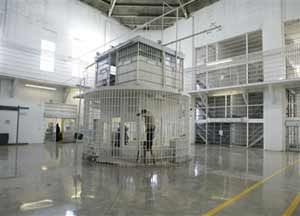By Tim Talley
Associated Press
Corrections employees occupy the central receiving area, which all inmates and corrections officers must pass through at the Oklahoma State Penitentiary. (AP photo) |
OKLAHOMA CITY, Okla — An Oklahoma workers union is calling for an investigation after it says two female corrections officers were strip-searched by investigators looking for gang-related tattoos.
Scott Barger, deputy director of the Oklahoma Public Employees Association, said Thursday his group believes the incidents violated policy.
“That is a very degrading event,” he said. “There needs to be some accountability.”
According to the association, a female officer at the Oklahoma State Penitentiary in McAlester was strip-searched on April 2 by a female investigator searching for a tattoo of the Indian Brotherhood, an American Indian prison gang.
The corrections officer acknowledged having tattoos but denied having one of the Indian Brotherhood, according to the association. The investigator asked her to display the tattoos, and the worker complied.
“The employee was asked to lift her dress and expose her calf, then lift the dress to her hips, and finally raise the dress above her head,” according to a letter of complaint by OPEA Executive Director Sterling Zearley to the corrections department. It says the agency should “take steps to correct the needless humiliation this employee has suffered.”
In a second incident on April 2, a female corrections officer at the Corrections Department’s training academy in Wilburton had to remove her jeans for an investigator who also was looking for an Indian Brotherhood tattoo, Barger said.
No such tattoo _ or any gang-related tattoos _ was found on either worker.
Jerry Massie, spokesman for the corrections department, said the agency had performed a preliminary inquiry and found “no indication of a strip search” because the workers had volunteered to expose themselves.
“It was appropriate,” Massie said. He said no further investigation is planned.
Massie said the prison system is sensitive to employees who may have gang-related tattoos because of the prevalence of gangs and gang violence in state prisons.


